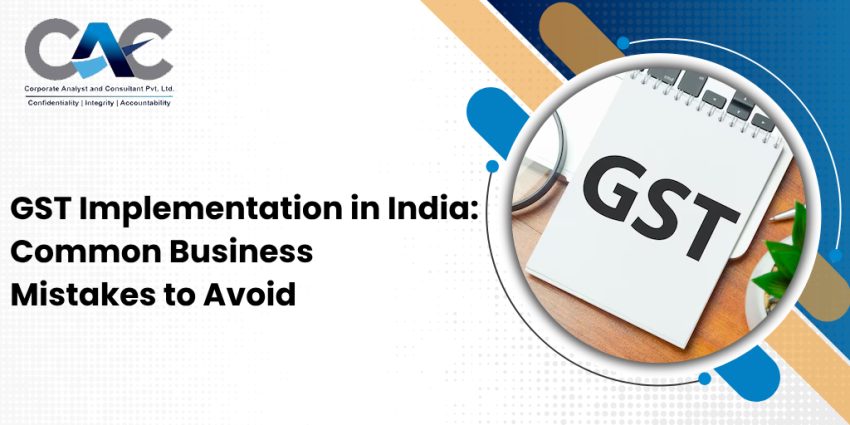CAC provides end-to-end GST implementation solutions that help businesses avoid costly errors and stay compliant from day one. There are more issues with GST besides registration and return filing. It entails a full changeover of the existing tax structures to a new system which needs accounting software to be updated, documentation and internal process amendment. Most companies have failed to recognize the trend of such shift and as such commit fatal errors when initiating them. Error going through system migration, invoicing, data entry, or input tax credit tracing may cause compliance problems, off-set returns and penalty costs. The companies can experience disturbance in their operations if there is a no systematic strategy. GST implementation company in India are necessary and required to guarantee a smooth implementation of GST and long-term compliance.
Hire GST Implementation Company in India: Avoid Common Mistakes Made by Businesses
Incorrect Mapping of Existing Tax Structure
Not making the correct links between their previous tax system (e.g., VAT, Service Tax, or Excise) and the GST formatted system is one of the most significant errors companies commit in the process of GST implementation. The incorrect migration results in incorrect tax codes, lower or higher GST rate and in the end, incorrect tax calculations. Failure to comply with business can be their loss of input tax credits as well as inaccuracy when entering invoices in the business. To surpass these complications, it is important to go through your old tax ledgers in details and match the taxes with the right GST slabs. Reigning mapping guarantees the reduction of transition and decreases possibilities of conflicts or even punishment on the future.
Not Updating Accounting Software
Usage of outdated accounting systems which are not GST enabled is a big setback to achieving successful implementation. Without GST-compatible software or ERP systems, businesses will not be able to generate invoices that comply with GST, capture HSN/SAC codes, or handle input and output taxes. This will lead to data mismatch and filing errors which can attract GST department penalties. To take advantage of the right GST-ready software and to include it sooner rather than later in the accounting and billing process is imperative. Also, make sure the system is updated in time when the GST rules are changing.
Poor Data Management and Documentation
Accurate records and tidy accounts are required to be compliant with GST. Missing supplier transactions, inventory differences, or type-in errors during sales or purchasing could all cause differences that make it more difficult to file. Firms may not be able to justify their claim as input tax credit during the time of audit especially where a firm has bad records. Regrettably, several enterprises do not seek a regular review of their information or retain quality records. They must then deal with the inability to match, inventory notices, returns not matching, delay in reconciliation. To maintain impeccable GST returns and full legal compliance of the company in the long run, effective data control measures, including frequent audits and record keeping are utilized.
Ignoring Employee Training
There are several departments that will be impacted by the adoption of GST, such as sales, logistics, accounts and procurement. Businesses on the other hand often do not pay much importance to efforts of educating employees regarding the new GST procedures. Compliance might be complicated because of ineffective training that means that the inaccurate employees may make mistakes during data entry, with tax classification, when producing bills, and documenting them. GST knowledge and practical training workshops play a significant role in helping teams to learn how to operate new software, issue proper invoices and maintain proper records. GST implementation company in India ensures easier GST operations, fewer errors and assist the company as the whole to implement GST effectively.
















